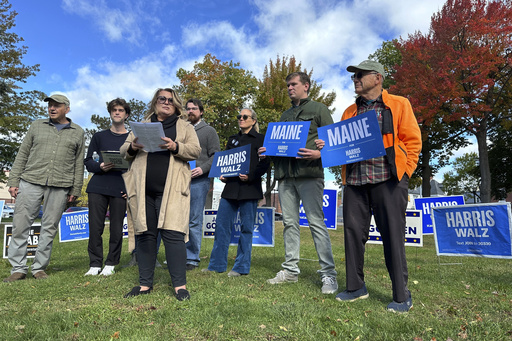
LEWISTON, Maine — Rob Rogers, a draftsman from the small town of Chesterville, has watched as his rural area in New England became a bastion of support for Donald Trump in the last two presidential elections. However, this year, he holds optimism that Vice President Kamala Harris could secure a significant electoral vote for the Democratic Party.
“As a registered Democrat, I find it astonishing that the Republican Party isn’t performing better,” Rogers commented. “It’s likely to be a close race, but I’m uncertain about the outcome.”
Democrats may need voters like Rogers to validate their hopes in this competitive presidential race, where every electoral vote could be pivotal. Notably, the Harris campaign has turned its focus toward Maine, a state that includes some of the nation’s largest, coldest, and most rural congressional districts. A portion of Maine could unexpectedly influence the presidential election this year and affect congressional control as well.
Maine stands out as one of the two states that distribute electoral votes by congressional district, the other being Nebraska. Trump has triumphed in Maine’s 2nd Congressional District by over seven percentage points in both elections, making it the only electoral vote he secured in New England. In 2020, it was also his sole electoral vote awarded northeast of Appalachia.
According to a poll from the University of New Hampshire Survey Center, Harris appears to have a competitive chance in the district. Maine’s Assistant House Majority Leader, Kristen Cloutier, expressed confidence at a rally for Harris, suggesting the potential to win back the critical electoral vote. “I am committed to mobilizing voters until election day,” Cloutier stated. “There is a role for everyone in this effort.”
As the presidential race heats up, it unfolds amid a heated congressional matchup between a former Marine and a stock car driver. Jared Golden, the incumbent Democrat, is defending his position against Republican state Representative Austin Theriault in one of New England’s most politically diverse districts.
Golden was first elected in 2018 and has comfortably won his last two elections. However, political analysts believe he could be at risk. According to Mark Brewer, a political scientist at the University of Maine, it would be unexpected but not unfeasible if Harris secures the district’s electoral vote while Golden fails to retain his seat. “It can seem contradictory. If Harris is performing better, Trump must be doing worse. It’s puzzling because while Trump may be losing ground, Theriault seems to be gaining momentum compared to previous Republican candidates,” Brewer remarked. “Still, both situations could prevail.”
Both political parties are investing in Maine, although expenditures are moderate. Democrats have made more substantial investments in presidential advertising, with around $150,000 allocated in the state’s media markets. In comparison, Republicans are close to $125,000. Most of this spending focuses on digital ads in the Portland-Auburn media region, which encompasses parts of both the 1st and 2nd congressional districts.
Interestingly, the Trump campaign has outspent Harris by a ratio of about two to one, though Harris’s campaign benefits from over $96,000 in backing from the One for All Committee, an external group.
Both parties believe they can win the congressional race and the electoral vote. Jason Savage, executive director of the Maine GOP, conveyed to supporters that “Maine is a battleground for control of the White House and Congress.”
The 2nd District is significantly larger than Maine’s more liberal 1st Congressional District, consistently won by Democrats. While the 1st District centers around Portland, the 2nd comprises smaller cities like Bangor and rural areas where traditional industries such as logging, potato farming, and lobster fishing underpin the local economy.
Historically, Maine’s statewide votes leaned Democratic since 1992 until Trump’s candidacy in 2016. His victory in the 2nd District was unprecedented, as he managed to capture one of Maine’s electoral votes despite not winning the statewide vote. With polling in seven states deemed critical to the election showing close margins, various scenarios could lead to a single electoral vote in Maine or Nebraska becoming essential.
An important issue for many voters in Maine is gun rights. The state has a high rate of gun ownership compared to the rest of the Northeast. Both Golden and Theriault emphasize their commitment to protecting these rights. Following a tragic mass shooting in Lewiston last year that resulted in 18 fatalities, Democrats instituted a series of new gun laws. However, opinions remain split in a state with a strong hunting culture.
John T. Reid, owner of J.T. Reid’s Gun Shop in Auburn, stated that he supports Republican candidates because he believes Trump and Theriault will more effectively uphold the Second Amendment. “I’ve noticed Trump’s popularity here has grown, and I think gun rights play a role in that,” Reid noted.
Both Harris and Trump have established campaign organizations in Maine, though the state hasn’t seen the level of extensive advertising or prominent candidate visits typical for swing states. Maine’s Democratic Governor Janet Mills publicly addressed Trump on social media due to a recent mishap during a call, but overall, the races in Maine have remained relatively uneventful.
Meanwhile, fundraising efforts are underway in the state. Harris has brought in over $3.4 million in Maine as of the end of August, surpassing her earnings in other crucial swing states, while Trump has raised just under $800,000. In the congressional race, Golden has significantly outpaced Theriault, with $6.6 million compared to Theriault’s $2.9 million. The two candidates have participated in three engaging televised debates, and Theriault has launched an email campaign to depict himself as more attuned to the concerns of Mainers. Golden, in contrast, focuses on his moderate stance and history of dissenting from strict party lines.
